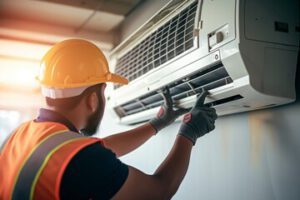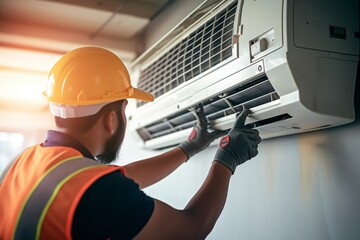The compressor, fan, and condenser coils of your air conditioning system work together to transfer heat from inside your home to the outdoor unit, producing a cool indoor climate. When these components are not working properly, your breaker may keep flipping. Use a brush and mild detergent to clean the evaporator coil. Also check the disconnect box fuses. Blown fuses can be easily replaced by a homeowner.
If your air conditioning unit isn’t working as it should, there are a number of potential causes. One of the most common and often ignored is a dirty filter. Changing the filter is easy and inexpensive, and it can help extend the life of your AC. For professional help, contact AC Repair Van Nuys now!
Air filters are a type of catch-all for contaminants that would otherwise reach the working components of your AC system. They are designed to catch pet hair, dander, dust, lint, mold, and other allergens and pollutants. Most are rated by their minimum efficiency reporting value, or MERV, to determine how effectively they work against different pollutants.
A clogged filter forces your system to work harder than it should, using more energy to cool your home. This can also lead to hot and cold spots in your home, resulting in higher energy bills.
Regularly cleaning or replacing your air filter can help alleviate some allergy symptoms and make the environment in your home more comfortable. It can also extend the life of your AC system, saving you money on repairs in the long run.
To check if your filter is dirty, pop it out and hold it up to the light. If you can no longer see through it, it’s time to change it out for a new one. Be sure to turn off power to your air conditioner before removing the old one, so you don’t accidentally touch live voltage or suck debris into the unit. Then, locate the proper replacement for your system (usually printed on the filter itself or in the owner’s manual), and pop it in place. It’s always a good idea to change out the air filter monthly or even more frequently, depending on your climate and household.
Compressor
The compressor is the heart of an AC unit. It pumps liquid refrigerant through the air conditioning system’s coils and condenser unit, drawing heat out of the house’s warm air. The cool air is then blown into the home through ductwork by an AC fan. A failing compressor can result in a number of AC repair issues, including short cycling (the AC shuts off and on repeatedly).
A faulty compressor may also cause uneven cooling in different rooms of the home. This is because the AC no longer has enough force to blow cool air to all parts of the house. If you notice this problem, it’s important to call an HVAC professional for AC repairs.
If your AC is under warranty, a new compressor may not cost you anything. This will depend on the specific manufacturer’s policies, and it’s best to talk with a technician before the warranty expires. If your HVAC system is a few years old, replacing the entire unit with a more efficient model may be worth the investment.
Another factor that can affect compressor repair costs is the type of air conditioner you have. Some types of ACs use a single-stage compressor, while others have two- or three-stage compressors that are more efficient but also cost more to buy and install.
If your air compressor isn’t working properly, you should also check for low refrigerant levels. This can be a result of a failed compressor, and if it’s not fixed in time, you could face expensive repair bills. Having the refrigerant recharged by a certified professional will save you money in the long run. You should never attempt to handle refrigerants on your own, as you need EPA certification in order to work with them.
Evaporator Coil
In an air conditioning system, the evaporator coil is inside and shaped like an “A.” It is responsible for cooling your home by taking in hot air, absorbing it, and then pushing cool air back through your vents.
Over time, a dirty evaporator coil can impact your HVAC system in multiple ways. This is why smart homeowners schedule routine maintenance services for their AC units with a professional. They can ensure that their evaporator coils are clean and properly functioning, so the entire HVAC system can work efficiently.
When a dirty coil is in operation, it will often cause your air conditioner to cycle more frequently. This is because the system will have to keep running to bring your home up to the temperature set on your thermostat. This will require more energy and may result in higher than usual electricity bills.
Another problem that can affect your evaporator coil is frost buildup. When a vaporizer coil is covered with frost, it will not be able to absorb heat from the air. This will cause your air conditioning to turn on and off more frequently and consume more energy than normal.
A faulty evaporator coil can also leak refrigerant. This can be a dangerous issue that requires immediate attention from an experienced professional. You should not touch or handle any refrigerant that is leaking, as it contains a toxic chemical that can lead to severe burns.
Corrosion can also occur on the evaporator coil over time. This is due to the chemicals from household items like new carpets, upholstery, and cleaning products that can mix with the condensation produced by the coil. This can also cause tiny pinhole leaks in the evaporator coil.
Fan Motor
The fan motor in an air conditioning system is responsible for blowing outdoor air over the condenser coil and converting the gaseous refrigerant into a liquid. It is a critical component, but it can wear out over time due to regular use. When it does, the AC system won’t cool your home.
If your AC starts to have trouble, you should check the fan motor first. Located in the condenser unit, it can be easily accessed by removing the screws around the cover and then turning off the power to the compressor. Then, you can listen for a humming sound and look to see if the fan blades are spinning. If they’re not, the fan motor is most likely worn out and needs to be replaced.
Other signs of a problem with the fan motor are that it keeps cutting in and out or making loud rattling noises. It could also start overheating or give off a burning plastic smell. The capacitor, which is a cylindrical component that supplies the electric charge to start the fan motor, can get extremely hot and should be handled only by a professional.
A trained technician can check the condition of an AC fan motor by checking the ohms reading, which is an international system for measuring resistance. A zero ohms reading means there’s a short in the windings and that the motor is faulty, while an infinite ohms reading indicates that there’s an open winding and that the motor needs to be replaced. The motor can also be checked for rust or dirt, which might have built up over the winter when the AC was dormant. It’s important to keep the motor clean, as it is one of the hardest-working components in your air conditioner.
Electrical
Electricity powers so many aspects of our daily lives that we often take it for granted. However, when your home’s heating and cooling system starts to fail, it often indicates a problem with one of the electrical components. Here are three examples of electrical issues that may need to be addressed by a professional during an AC repair visit:
If your air conditioner is tripping the circuit breaker, it’s time to call for help. A faulty thermostat or airflow obstructions can cause your unit to trip the breaker. This means it’s not working properly, so you need to have a technician look at the problem and fix it right away.
If you notice a spike in your energy bill, that’s another sign that it’s time for a professional to inspect the unit and make any needed repairs. The air conditioning system uses a lot of power to cool your home, so any problems can increase your utility bills quickly.
A humming sound coming from your air handler or outdoor unit is a sign that the capacitor has failed. Capacitors work to transfer heat from the compressor to the evaporator coil, so they’re crucial for cooling your home. A burning smell is also a common sign that the capacitor is overheating and needs to be replaced.
Rust can affect the performance of your air conditioning unit in a number of ways, from making it less effective at cooling to increasing humidity inside your home. High humidity levels make it hard to breathe and can lead to mold and mildew growth, so it’s important to have any rusting parts of your AC repaired right away. A qualified HVAC technician can remove and replace a damaged capacitor or switch, as well as clean and lubricate the fan motor to restore smooth operation.
